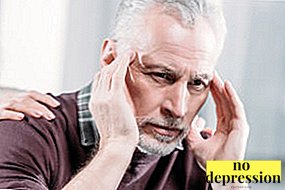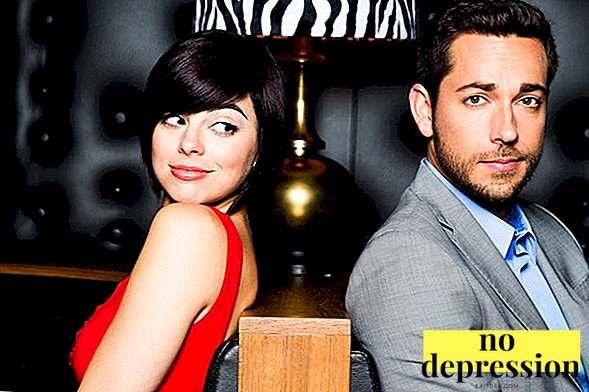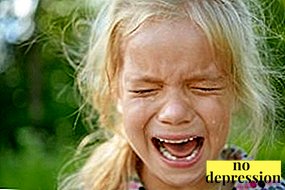Hallucinations are an image that results from perception process errors one or more senses.
Such an image exists only in the head and has no connection with reality (external stimulus), but at the same time it may have a sensual coloration and be very persuasive.
Causes

Who is subject to hallucinations?
The appearance of hallucinations directly related to the state of the brainin which images, voices, smells and images that do not correspond to reality appear.
Very often hallucinations are a symptom of schizophrenia or the result of the use of hallucinogenic drugs.
The brain is still not fully understood by science and is a mystery to scientists. Therefore, all the processes occurring in it cannot be explained precisely and unambiguously, as well as a detailed study of the causes of the resulting disorders.
But all the reasons can be divided into three categories:
- internal (hereditary diseases that affect the human brain and nervous system);
- external (acquired diseases and pathologies, such as severe concussions, poisoning and infectious lesions of the body, etc.);
- temporary (metabolic disorders, non-pathological, such as lack of sleep or stress).
Visual hallucinations develop on the background of alcoholism, abuse of drugs and psychotropic substances, taking certain medications and even food poisoning.
Visual and auditory hallucinations are manifested in complex against the background of mental illnesses, such as schizophrenia, hallucinosis, psychosis and certain types of seizures.

Hallucinations of the olfactory species occur with lesions / injuries of the brain.
The cause of violations can be infection (encephalitis, malaria, typhoid, etc.) or blow / contusion of the temporal region, as well as schizophrenia and other diseases.
Tactile hallucinations appear as a result of withdrawal syndrome against the background of alcohol abuse. False sensations on the body and inside it can also be triggered by encephalitis, schizophrenia.
Risk group
There are groups of people who are predisposed to hallucinations as a result of their lifestyle or current state of the body.
- Elderly people. The aging process is inevitably associated with changes in the body and irreversible processes in the brain.
After 60 years, the patient may be diagnosed with paranoia or dementia, which is the cause of hallucinations.
Rheumatic diseases and cardiovascular pathologies in the decompensation stage also provoke false images.
- People suffering from alcoholism. Severe alcohol poisoning leads to delirium tremens and hallucinations. Alcoholic psychosis, delirium are acute psychotic states associated with impaired functioning of the brain and sensory organs.
- Prone to depressed people. The depressed state of mind, an increased level of anxiety, depressive view of reality and phobias can lead to the appearance of hallucinations and various visions.
- People who could genetically inherit mental disorders. If a person has had schizophrenia in the family, hallucinations may become the first sign of inheritance of pathology.
- People taking drugs. Even if the use of narcotic drugs does not lead to hallucinations directly during the action of the drug, perception disorders may occur after (during the withdrawal period, due to withdrawal symptoms).

What to do: which doctor to contact?
Hallucinations are an unhealthy condition of the body that signals violationsrequiring correction.
At the same time, disorders in perception are not an independent disease, but a symptom of various pathologies (physical or mental).
For the treatment of the symptom is necessary find out the reasonwhich provoked hallucinations. You can not ignore medical care and self-medicate, even if the hallucinations appear mild.

First of all, a person with perceptual disorders should refer to general practitioner, psychiatrist and neuropathologist.
As an accompanying examination, a physician can refer a patient to an oncologist, narcologist, and others. narrow specialistswho will analyze the patient’s condition and confirm / disprove the presence of diseases that caused the hallucinations.
Hallucinations grandmother after a stroke
Stroke - This is a serious condition that requires long-term treatment and recovery.
But even in the case of proper treatment, complications can be detected (blood circulation disturbance in the brain, irreversible processes and delirium). Against the background of these pathologies there is a violation of perception.
Post stroke hallucinations look like incoherent speech, illusions and state of delirium. The patient may complain about strange visions and images, aware of his condition, or believe in hallucinations, considering them to be real.

Relatives of the patient in case of post-stroke hallucinations should provide security as a person with a perception disorder, and people around him.
Call an ambulance it is necessary to be imperceptible for the patient in order not to provoke an attack of aggression or an increased level of anxiety
Strictly prohibited any manifestations of unhealthy interest, challenging the words of the patient and panic, as all of this can aggravate the situation.
In a state of psychosis, sick people are in a state of agitation and experience a surge of physical strength.
Therefore, it is necessary that in the room there were at least 3 people who could pacify the patient. In some cases, even weaker elderly people and patients in the postoperative period can reach the window or door, causing physical damage relatives (on the background of psychosis).
Do not leave sharp and heavy objects in the patient's room. You also can not leave a person with hallucinations. unsupervised.
It is strictly forbidden to use drugs for stopping hallucinations without medical recommendations. All actions must be coordinated with a specialist.
How to help yourself if visions arise?

How to get rid of hallucinations?
If you suspect you have hallucinations or are confident of perception disorder, try do not panic.
Firstly talk to a loved onewho can refute frightening visions / voices, etc. Enlisting support can reduce anxiety.
If the visions have arisen due to poisoning, taking psychotropic substances, drinking alcohol, you must go to hospital immediately.
Even if the hallucinations are not associated with malaise / pain and ailments, it is simply necessary to seek medical help and find out the root cause.
In the later stages, it is very difficult to cure hallucinations or alleviate the symptoms.
Heat may cause hallucinations. In this case, antipyretics (Ibufen, Paracetamol) will help to quickly cope with the unpleasant symptom.
Stress, lack of sleep and severe fatigue lead to hallucinations. If you understand that the body is on the verge of exhaustion, you need to rest (go to bed, turn off the messengers and get away from things).
It is important on time and honestly admit that the help of a specialist is necessary. Man with hallucinations can't help myselfas the line between real and unreal is erased.

There is a substitution of perception, and the patient is more and more immersed in his world of visions.
Getting out of this vicious circle is almost impossible, as with progressive diseases a person begins be confused in sensations and believe in hallucinations.
Treatment methods
Hallucinations caused by triggers (psychotropic substances, poisoning, hypnosis, drugs) treat by getting rid of the harmful effects (directly trigger).
The only exceptions are those situations in which external factors led to changes in the body or provoked withdrawal syndrome.
Hallucinations on the background of psychotic disorders are treated by correcting the underlying pathologythat provoked perception disorder. To do this, use neuroleptics.

If the underlying pathology is not treatable (senile dementia), then therapy is aimed at acute phase relief hallucinations.
If hallucinations were caused by taking drugs or alcohol, the patient must pass rehabilitation course.
Scheme
How to treat pathology? What medications will help?
Treatment of hallucinations is an individual therapy. The drugs are selected on the basis of the clinical picture, the type of hallucinations, the pathology of the root cause and the emotional state of the patient.
The list of mandatory measures includes:
- taking medication according to an individual scheme;
- isolation of the patient for the time of the acute period (directly hallucinations);
- individual psychotherapy for the rehabilitation of the patient and his return to the usual life.
Drug names
What pills to take to the patient? Apply to fight against hallucinations antipsychotics (neuroleptics):
- Clozapine;
- Quetiapine;
- Risperidone;
- Olanzapine;
- Ziprasidone.

For the relief of acute excitement and delirium prisupov intramuscular injections:
- Teasercin;
- Aminazine;
- Haloperidol;
- Trisedil.
If the patient is depressed, he is prescribed antidepressants. To combat anxiety use tranquilizers, and in case of weakness they use stimulants.
It is very important not to panic at the appearance of hallucinations and not to try to hide from others the fact of a violation of perception.
Often, the reluctance to seek help is caused by fear of the upcoming treatment, shame, or the belief that a case is single and not dangerous.
However, in the long run this strategy will only lead to deterioration of the patient's condition and complete loss of normal life, loss of control over reality and own actions.
When hallucinations do not require treatment:



